It was a privilege to get to provide books at a recent lecture at the Ecumenical Institute at St. Mary’s Seminary and University in Baltimore. It is always good being with them as they blend academic rigor and faith-based hospitality and graciousness, all in a very diverse, ecumenical setting.
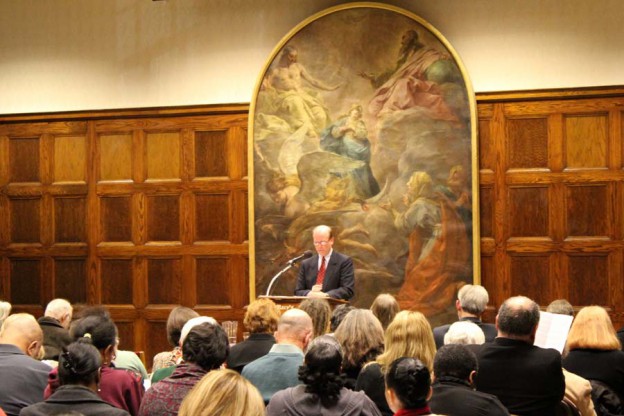

 The star of the evening was a friend and customer, the widely respected Biblical scholar and theologian, Dr. Michael J. Gorman.
The star of the evening was a friend and customer, the widely respected Biblical scholar and theologian, Dr. Michael J. Gorman.
We were gathered to celebrate Dr. Gorman’s most recent book, Becoming the Gospel: Paul Participation, and Mission (Eerdmans; $28.00.) I’ve mentioned this book here at BookNotes before, but after hearing Mike lecture on it, explaining some of the backstory and his hopes for the book – -and hearing the other panelists respond, which was inspiring in equal measure — I just had to promote his work again. It really is rich, good stuff!
Kudos, first, to the two respondents to Gorman’s presentation on the book. First there was the joyful, thoughtful, missional theologian, Barth scholar, and Director of the Gospel and Our Culture Network, Dr. John R. Franke, who wrote, among other things, Manifold Witness: The Plurality of Truth (Abingdon; $17.99. ) Also responding to the lecture was the always energetic World Relief President Stephan Bauman, whose new 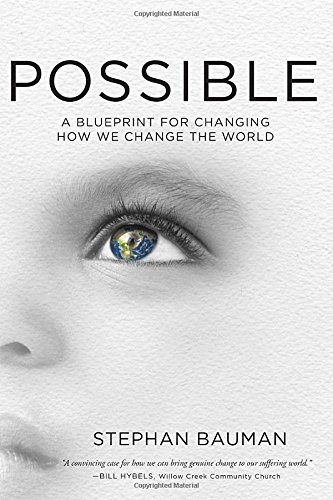
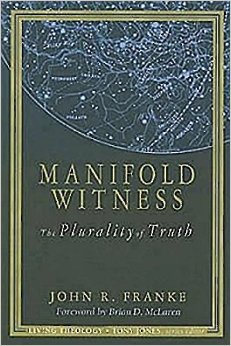 book on social change, Possible: A Blueprint for Changing How We Change the World (Multnomah; $22.99) was also a big part of the night.
book on social change, Possible: A Blueprint for Changing How We Change the World (Multnomah; $22.99) was also a big part of the night.
It would be like Mike and the E.I. (Ecumenical Institute) to have a culturally-engaged theologian and a global justice activist responding to his exegesis of the Apostle Paul. What an evening it was!
To give you a further hint about Gorman, you should know that not only has he served St. Mary’s and the E.I. (formerly as Dean, now as holder of the Raymond E. Brown Chair in Biblical Studies and Theology) but he has participated in national and international working groups and forums within organizations such as the Society of Biblical Literature. He knows everybody in the field, and regularly brings world class leaders to the E.I. such as Eugene Peterson, Miroslov Volf, Ellen Davis, Rowan Williams, James Dunn — they have N.T. Wright coming yet again this November 18th, doing the 2015 Dunning Lecture (and another day of professional development, November 19th.)
Mike himself is known and respected widely. I was joking with a scholar in the room about how Mike’s new book on Paul does not have a blurb on the back from world-famous N.T. Wright. We made some friendly Tom Wright jokes, and he suggested that Gorman could blurb Wright, but didn’t need that world-renowned scholar to endorse him. Ha. It is true, for the record, that Mike thanks Tom in the acknowledgements, along with other luminaries in New Testament studies, such as Richard Hays, Beverly Gavanta, Steve Fowl, Joel Green, and the like. He is involved in lovely networks of collaboration and even has some further Hearts & Minds connections: Mike is friends with Brian Walsh and Sylvia Keesmaat, authors and scholars and activists whose work we regularly mention.
If you don’t know Gorman’s books, you owe it to yourself to read a few. It is curious to me that although he is so esteemed in the scholarly world and so many important scholars like and respect him, that his name hasn’t become as well-known as it should be. So, here ya go: if you don’t want to wade through N.T. Wright’s massive two-volume masterpiece on Paul, try these. They really are just as good and equally important. I think Tom himself would agree, even if they quibble about some fine-tuned disagreements here and again.
So, Gorman is a wonderful guy and an important figure. As both Franke and Bauman acknowledged at this book release event, his work really is significant, and, importantly, generative and inspiring, worthy of study because it can help us live differently, more faithfully.
CRUCIFORMITY
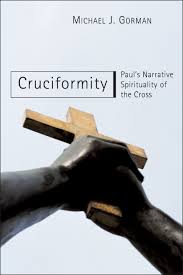 The first thing you should know about the exquisite Becoming the Gospel: Paul Participation, and Mission is that it stands (almost un-intentionally, as Mike explains it) as the third in a trilogy of books on St. Paul. Mike has been studying and teaching and preaching on the great “apostle of the heart set free” since his PhD at Princeton in the 1980s.
The first thing you should know about the exquisite Becoming the Gospel: Paul Participation, and Mission is that it stands (almost un-intentionally, as Mike explains it) as the third in a trilogy of books on St. Paul. Mike has been studying and teaching and preaching on the great “apostle of the heart set free” since his PhD at Princeton in the 1980s.
His first major book on Paul, Cruciformity: Paul’s Narrative Spirituality of the Cross (Eerdmans; $38.00) came out in 2001 and remains an essential volume for anyone with a serious library on Pauline studies.
That book with the evocative title threw down and explored Gorman’s primary thesis, at once simple and yet one which could take a life-time to embrace and embody: Paul’s own spirituality was based on his desire to experience the cross of Christ, to embrace a form of piety that is cross-shaped.
The first sentence of the book is from 1 Corinthians 2:2 — “I decided to know nothing among you except Christ and him crucified.” Or, as Gorman shows with a quick grammar lesson, Paul’s words are explanatory and urgent in the last phrase, which should be rendered “…know nothing among you except Jesus Christ – that is, Jesus Christ crucified.” This is Paul’s extraordinary point, and Gorman helps us see it: Christ being crucified, known as the suffering servant, He comes not to condemn but to die, and to thereby show us how to live. (Indeed, at the end of his own life, Peter writes in his letter a reminder that Christ’s nonviolence in his arrest [which Peter, at the time, embarrassingly misunderstood, cutting off that soldiers ear] is an example of how we are to live!) Few scholarly books have as much vibrant piety and live-it-out-in-the-real-world wisdom. And few are, dare I say it, as revolutionary!
I ought not oversimplify this 400+ page magisterial work, as it rigorously engages most major Pauline interpreters (past and present) but Cruciformity does come down to this, pondering why Paul so often used “the cross” as shorthand for a whole way of life, a spiritual ethos of discipleship that is counter-intuitive, glory by servanthood. This big book does offer ways into this cross-shaped way of life and reflects some of the missional energy of the popular-level Tom Wright (or more so) and offers some of the suggestions of Biblical nonviolence and peacemaking from those like Richard Hays. This is nearly a subversive spirituality, a revolutionary Paul. Gorman’s anti-Empire readings were pioneering ( think of Chad Meyers on Mark or Walsh & Keesmaat on Colossians.) He is not Girardian or overly indebted to Walter Wink, but if you appreciate their insights you will value Gorman’s work as well. This is a new perspective beyond what some call “the new perspective” on Paul. And it matters.
Listen to what Stephen Fowl says of it.
In an age when spirituality is often simply a mask for self-projection and self-assertion, Gorman’s Paul reminds Christians that such vital matters as faith, hope, love, and power should be shaped by the story of the crucified and resurrected one rather than by our own whims and desires. This book is readable and timely, and it will enhance the lives of contemporary Christians.
Cruciformity: Paul’s Narrative Spirituality of the Cross includes some serious cultural critique, and invites us to ponder a “charismatic and prophetic” spirituality which is shaped by the ways of the Cross. As M. Robert Mulholland of Asbury Theological Seminary writes, “Gorman… provides cogent arguments against some of the special-interest readings of Paul. This book has the potential to challenge both the academy and the church to a reconsideration of Paul that could revolutionize Pauline scholarship and transform the life of the church in the world.”
That, my friends, is one of the reasons we sell the books that we do, and it is why we request your support, buying books from us that, as Mulholland put it, can challenge the scholarly world and transform the life of the church, for the sake of the world. Gorman is an ally in this bold project, and we commend his work to you.
INHABITING THE CRUCIFORM GOD
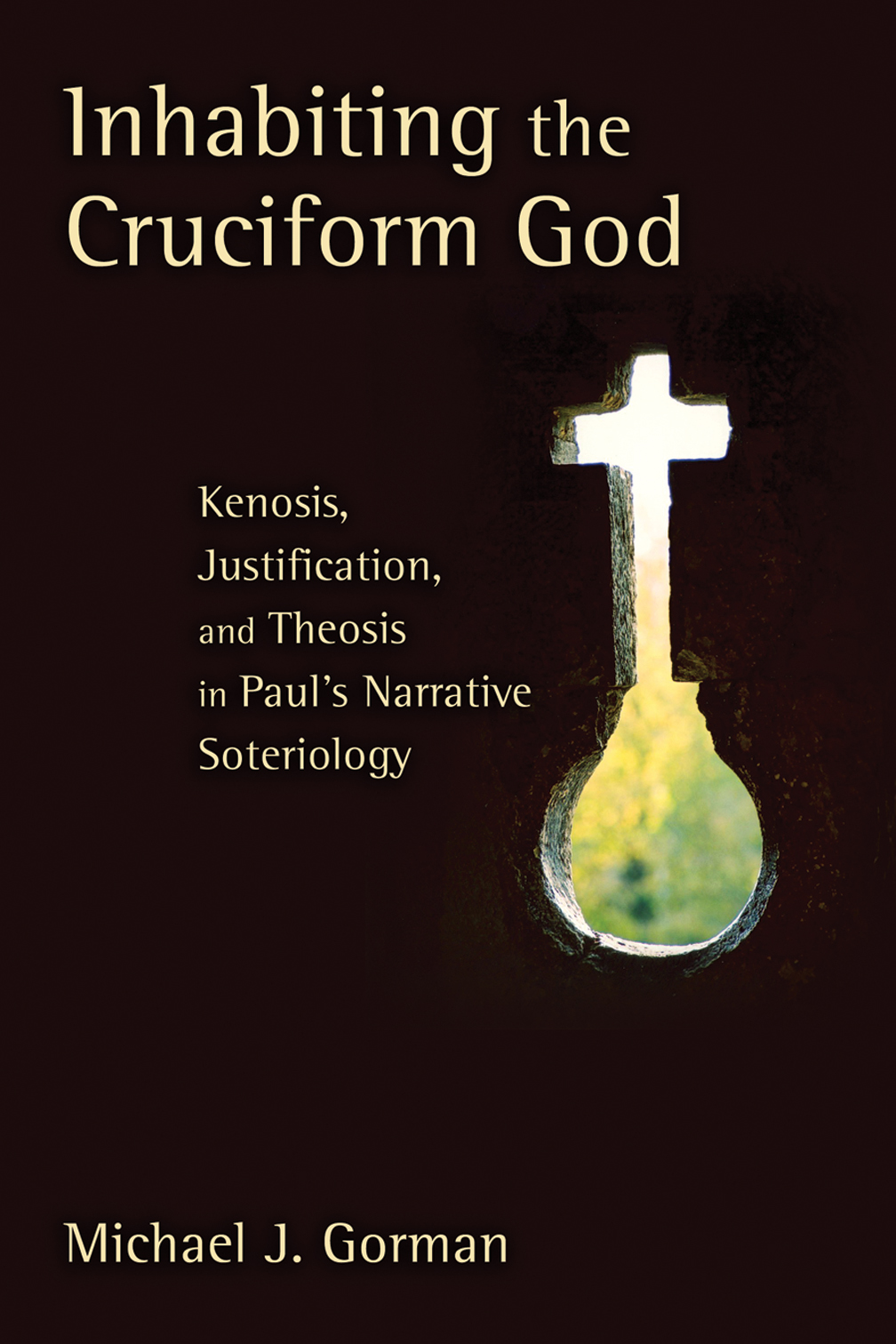 Inhabiting the Cruciform God is the second in the trilogy, and I am afraid that the allusive cove art and the theological lingo in the subtitle might turn some people off. But it shouldn’t! Again, Gorman is on to something big, here, and it makes sense. If, as he argued in the earlier book, the cross is the heart of the gospel and shaped Paul’s own sense of spirituality and mission, then – get this – it must not just be Paul’s understanding of the way of Jesus but it is the very heart of God. With a proper Trinitarian view of Christ (He is God, as the early creeds insist) then what we know from Jesus is a revelation of God’s own self. And so, if Jesus comes to give His life as a ransom for many, if he comes not to judge the world but to save it, if He is the grand lover, healer, restorer, crucified Lamb, redeeming King, then that must also be the attributes of God the Father and God the Spirit and constitutive of their holy way and work. The subtitle of Inhabiting the Cruciform God is dense, but even those of us not trained in theology can figure it out: Kenosis, Justification, and Theosis in Paul’s Narrative Soteriology. (Somebody joked at the EI forum that Tom Wright, known for long and thick books, “needs an editor.” Ahem. What were they thinking up at Eerdmans when they cooked up this subtitle?)
Inhabiting the Cruciform God is the second in the trilogy, and I am afraid that the allusive cove art and the theological lingo in the subtitle might turn some people off. But it shouldn’t! Again, Gorman is on to something big, here, and it makes sense. If, as he argued in the earlier book, the cross is the heart of the gospel and shaped Paul’s own sense of spirituality and mission, then – get this – it must not just be Paul’s understanding of the way of Jesus but it is the very heart of God. With a proper Trinitarian view of Christ (He is God, as the early creeds insist) then what we know from Jesus is a revelation of God’s own self. And so, if Jesus comes to give His life as a ransom for many, if he comes not to judge the world but to save it, if He is the grand lover, healer, restorer, crucified Lamb, redeeming King, then that must also be the attributes of God the Father and God the Spirit and constitutive of their holy way and work. The subtitle of Inhabiting the Cruciform God is dense, but even those of us not trained in theology can figure it out: Kenosis, Justification, and Theosis in Paul’s Narrative Soteriology. (Somebody joked at the EI forum that Tom Wright, known for long and thick books, “needs an editor.” Ahem. What were they thinking up at Eerdmans when they cooked up this subtitle?)
Well, it is substantive, like the book. And it does illustrate exactly what this slimmer volume (under 200 pages) is teaching us: God becomes Christ, Christ gives up his Divine privileges (a la Philippians 2 which Gorman calls “Paul’s master story”) to serve humankind and the creation itself. If this is true, Gorman writes,
then cruciformity is really theoformity, or, as the Christian tradition (especially in the East sometimes calls it) deification , divinization, or theosis. It is conformity to Christ, or holiness, understood as participation in the very life of God — inhabiting the cruciform God. This conclusion is implicitly in Cruciformity but not fully developed there.
UNION WITH CHRIST/PARTICIPATION IN GOD
This is a fundamental category for understanding Paul – “participation.” For Gorman, this theosis is a bit more than the classic Western construct of “union with Christ.” We get to join in to his life, death, resurrection, and live into the story of His redemption “for the life of the world” and this is linked to how we understand salvation and how we become what we are meant to be. There is a fascinating paragraph early on in this book suggesting that Richard Hays saw that the study of Paul’s soteriology needed to move in the direction of theosis, and suggested ways E.P. Sander’s work could be helpful, and could be improved “by a careful study of participating motifs in patristic theology, particularly the thought of the Eastern Fathers.” Fascinating and worth pondering, even though my words here don’t do it justice at all.
Again, for those of us who aren’t used to this theological lingo, it could seem daunting. But it makes sense, it really does, and you will be blessed by a careful reading. Gorman is an able teacher, delightfully ecumenical, deeply desiring to be faithful and helpful. He writes,
For Paul, to be one with Christ is to be one with God; to be like Christ is to be like God; to be in Christ is to be in God. At the very least, this means that for Paul cruciformity – conformity to the crucified Christ – is really theoformity, or theosis. The argument of this book about these claims will also suggest that Paul’s famous phrase “in Christ” is his shorthand for “in God/in Christ/in the Spirit.” That is, his christocentricity is really an implicit Trinitarianism.
Okay, again, don’t let the curious words scare you off. This is rich stuff, with lots of explanatory footnotes and a few good suggestions for living all this out, showing the difference it makes for ordinary discipleship and congregational life. Gorman is not interested in the arcane world of scholarship for its own sake, or nitpicking. He is showing us how if the insights of his first book about being cross shaped inform our very understanding of our oneness with God and our role in God’s redemptive love. At times it brings to mind the rich poetry of old, doctrinally heavy but beautifully rendered hymns. Love Divine, indeed!
Here is how Frank Matera of Catholic University of America describes this potent book:
In this pioneering work Michael Gorman offers a fresh way to view Paul’s understanding of justification and holiness. Cutting a new path through old territory, Gorman leads us to a vision of holiness and justification rooted in the transforming power of nonviolence and the cross. His work will provide pastors with new insights for preaching and scholars with new ways to address old questions.
Which leads us to the book we celebrated the other night at the lovely event in Baltimore, the book John Franke and Stephen Bouman joined in affirming, sharing their great belief in the significance of Dr. Gorman and especially of this, his crowning achievement in his energetic work on Paul.
BECOMING THE GOSPEL
 Becoming the Gospel: Paul, Participation and Mission is not only a great book on Paul, not only a creative and fruitful approach to understanding Paul’s themes of spirituality, salvation, discipleship, living in the Kingdom, and a fine capstone to his logical progression about cruciformity and participation in God, but it is a major contribution to what we might call the missional conversation. This book, even more than the others, has Pauline zeal, a passion to reach the nations, a hope for social transformation via a renewed and Christ-like church. Not unlike Gorman’s friend Tom Wright, this is scholarship in service to the church, offered with a desire to see God’s people be shaped by the things of God, the very gospel.
Becoming the Gospel: Paul, Participation and Mission is not only a great book on Paul, not only a creative and fruitful approach to understanding Paul’s themes of spirituality, salvation, discipleship, living in the Kingdom, and a fine capstone to his logical progression about cruciformity and participation in God, but it is a major contribution to what we might call the missional conversation. This book, even more than the others, has Pauline zeal, a passion to reach the nations, a hope for social transformation via a renewed and Christ-like church. Not unlike Gorman’s friend Tom Wright, this is scholarship in service to the church, offered with a desire to see God’s people be shaped by the things of God, the very gospel.
The ideas of the earlier books have really grown legs and here we see where it is all going.
As you can guess from the title, and as you can see from the trajectory from the other books, if we are joining with God in Christ, we are therefore agents of God’s reconciliation, transformed people, for the sake of the reign of God, pointing towards, bearing witness to, the restoration of all things. God is a missional God, and we are joining God by participating in God’s work in all of life. We don’t just think about or understand or desire God and the gospel, we are not even just shaped by it, but we become it. How Gorman comes to see that, and the implications of it, are truly remarkable and are spelled out in Becoming the Gospel.
HOW TO READ THE BIBLE: HERMENEUTICS 101
This book is a fabulous tool to help us read Paul rightly. But it is also a case study of how to read the Bible, any of the Bible, really. As Dean Flemming (author of Recovering the Full Mission of God: A Biblical Perspective on Being, Doing, and Telling, a book Mike mentioned in his own talk) says, “This book is a tour de force in missional hermeneutics.” You know what a tour de force is, and that should make you take notice (we can’t buy every good book that comes out, not even every good book I most heartily recommend. But the few that garner this kind of rave? You should really consider owning such respected works!) Okay, it’s awesome; got it. But what does he mean by “missional hermeneutics”?
The definition is hermeneutics pretty easy to grasp. Doing it well is an art and a science and we need guides and a lot of help, being self-aware and intentional of our own approaches and biases, in community. For some of us it will come rather naturally, for others, this is a real paradigm shift.
Hermeneutics is simply the philosophy of interpretation. (Here are some mostly reasonable guidelines about Biblical hermeneutics of a fairly conventional sort; it is curious, though, that they seem to presume these principles and methods are just givens, natural and right.)
 Reading well and understanding and applying (any book, including Holy Scriptures) always happens from within a certain set of presuppositions, with assumptions, values, attitudes; this implicitly draws out what is seen and what isn’t, what is considered important and what isn’t, what is underscored and what is minimized, how we understand and make sense of the
Reading well and understanding and applying (any book, including Holy Scriptures) always happens from within a certain set of presuppositions, with assumptions, values, attitudes; this implicitly draws out what is seen and what isn’t, what is considered important and what isn’t, what is underscored and what is minimized, how we understand and make sense of the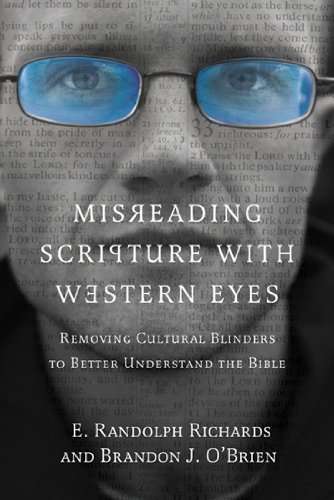 words and sentences on the page, and – if one has a sensible hermeneutic – the way things fit together, the context of the text. But these “rules of the game” are themselves contested. Everybody reads and interprets by some rules or working assumptions, and there are certain philosophical and theological presuppositions that are taken for granted, usually, that are operative and shape how we interpret. Nobody is objective, obviously, and everybody has a lens through which they make meaning of things, and they interpret, then, consciously or not, shaped by those habits of heart and believes and practices that color and shape us.
words and sentences on the page, and – if one has a sensible hermeneutic – the way things fit together, the context of the text. But these “rules of the game” are themselves contested. Everybody reads and interprets by some rules or working assumptions, and there are certain philosophical and theological presuppositions that are taken for granted, usually, that are operative and shape how we interpret. Nobody is objective, obviously, and everybody has a lens through which they make meaning of things, and they interpret, then, consciously or not, shaped by those habits of heart and believes and practices that color and shape us.
(One interesting way to learn a bit about this would be to consider the fine book Misreading Scripture with Western Eyes: Removing Cultural Blinders to Better Understand the Bible by E. Randolph Richards & Brandon J. O’Brien, published by IVP; $16.00.)
That is the art of hermeneutics, reflecting on the rules of reading, the way in which interpretation happens. It’s not all that complicated, really, but it’s a handy five dollar word; there are various “schools of thought” that shape different hermeneutics. Gorman stands in the energetic tradition which interprets the texts in light of God’s overall redemptive plan, God’s own missional self-giving, the Big-Picture Story which ends in the redemption of God’s people and the reconciliation of enemies and the restoration of all creation, and which calls forth our participation in that missio dei. The vocation of receiving God’s gift of grace (in Christ) in ways that transform us into partners with God is central, and thereby shapes how we interpret the Bible itself. Call it an active, missional hermeneutic, with a cross-shaped lens.
CHURCH MATTERS
And, by the way, we do that dance together. The church — past and present — is the primary location for missional hermeneutics. That is, we can’t really explain to the world what the Bible means until we see what it means, living among us. “Lookie here,” we can then say, “this is what the coming Kingdom sort of looks like and here is then how we make sense of this story, this law, this poem, this text, this parable, this letter. We’re a pilot project of the new creation and joining us here enables us to see up close what it all means.” We engage the world, to be sure, but the local community of place, standing with the global church and the communion of the saints, too, is the space to interpret the texts, together, in light of what we are becoming. This missional hermeneutic, it seems to me, favors the embodied and the communal. Church matters, even to help us understand the living Word.
PAUL ON PAUL?
![]() The big question, of course, is if this hermeneutic is the most faithful, fruitful, proper and wise lens through which to interpret the Bible. Oy vey! We need to ask the Bible itself how to interpret the Bible itself, and different hermeneutics will lead us to answer that almost circular question differently. Well, Becoming the Gospel: Paul, Participation and Mission offers a splendid way to read and makes sense of the Bible, including, and especially Paul. On display here is indeed a missional interpretation, a hermeneutic that sees in the text the stuff that (or so Mike claims) is what is most truly intended, and most faithfully embodied now. His approach to Paul is true to Paul and wise for our own discipleship as we are shaped into missional communities in our own context. Other readings may be less so, and this is the reason to know this book, to grasp his take on things, and to appreciate the “method in the madness” – that is, the “missional hermeneutic.”
The big question, of course, is if this hermeneutic is the most faithful, fruitful, proper and wise lens through which to interpret the Bible. Oy vey! We need to ask the Bible itself how to interpret the Bible itself, and different hermeneutics will lead us to answer that almost circular question differently. Well, Becoming the Gospel: Paul, Participation and Mission offers a splendid way to read and makes sense of the Bible, including, and especially Paul. On display here is indeed a missional interpretation, a hermeneutic that sees in the text the stuff that (or so Mike claims) is what is most truly intended, and most faithfully embodied now. His approach to Paul is true to Paul and wise for our own discipleship as we are shaped into missional communities in our own context. Other readings may be less so, and this is the reason to know this book, to grasp his take on things, and to appreciate the “method in the madness” – that is, the “missional hermeneutic.”
I’m no scholar, and certainly Gorman himself stands open to correction, but I think Chris Tilling (author of Paul’s Divine Christology) is really right when he says that “Gorman writes in ways that resonate with the missional concerns of the gospel itself.”
THE GOSPEL AND OUR CULTURE NETWORK
 Interestingly, this fascinating book of New Testament theology gleaned from careful attention to Paul’s own missional vision, is the latest volume in an on-going series (the general editor of which is the aforementioned John Franke) of books from the Gospel and Our Culture Network. That network helped popularize the (now faddish and woefully misunderstood) phrase “missional” (first brought to us by Darrell Guder, I’ve heard) and remains a helpful voice and service to the church. Yes, Becoming the Gospel: Paul, Participation and Mission stands as a new volume in that important series.
Interestingly, this fascinating book of New Testament theology gleaned from careful attention to Paul’s own missional vision, is the latest volume in an on-going series (the general editor of which is the aforementioned John Franke) of books from the Gospel and Our Culture Network. That network helped popularize the (now faddish and woefully misunderstood) phrase “missional” (first brought to us by Darrell Guder, I’ve heard) and remains a helpful voice and service to the church. Yes, Becoming the Gospel: Paul, Participation and Mission stands as a new volume in that important series.
LESSLIE NEWBIGIN, GOOD CONTEXTUALIZATION, AND BAGGAGE, OH SO MUCH BAGGAGE
Here is something you should know about the Gospel and Our Culture Network: it started years ago out of the vision and guidance of the late Lesslie Newbigin. Newbigin, as I hope you know, was a British missionary in India, whose influential work about the nature of cultures and the relationship of cultures and the gospel is still studied and carried on today. (Here is a very useful Newbigin website gathering together some of his work and here is a fantastic article about him and his views.)
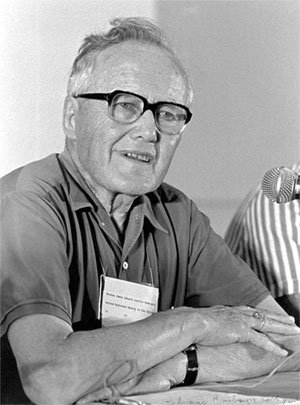 Early on in his work in India realized, obviously, as most missionaries do, that other cultures do things differently, and, as a guest to that foreign culture, he noticed so much that was different, even among the churches, and he wondered why. Why does the Indian church think that, believe this, do those things, in those ways? Maybe with a bit of arrogance, he wondered why they couldn’t see that their own cultural context was perhaps causing them to misunderstand some Biblical truths, to live in ways that were accommodated to their own South Asian world. As he lived as part of the Indian church for decades and decades his orientation and worldview shifted, and his burning questions became focused on why does the West does things as we do? How has our modern, secularizing culture shaped (deformed?) our own understanding of the gospel itself? Are we accommodated to culture in ways we don’t even see?
Early on in his work in India realized, obviously, as most missionaries do, that other cultures do things differently, and, as a guest to that foreign culture, he noticed so much that was different, even among the churches, and he wondered why. Why does the Indian church think that, believe this, do those things, in those ways? Maybe with a bit of arrogance, he wondered why they couldn’t see that their own cultural context was perhaps causing them to misunderstand some Biblical truths, to live in ways that were accommodated to their own South Asian world. As he lived as part of the Indian church for decades and decades his orientation and worldview shifted, and his burning questions became focused on why does the West does things as we do? How has our modern, secularizing culture shaped (deformed?) our own understanding of the gospel itself? Are we accommodated to culture in ways we don’t even see?
Certainly every culture has benign and delightful ways that can be used to proclaim and show forth the gospel. Missionaries are keen on contextualization, and we should consider how to do this well in our own postmodern, twenty-first century culture. Perhaps that is the more fun task, the endless, creative question of how to translate the gospel into our own culture, or subcultures, and live it out in faithful relevance.
But, also — and here we must not be naïve — every culture has less than benign, maybe even harmful, assumptions and attitudes and beliefs and social arrangements and patterns and systems that distort our faith and our practices. Every culture has good insights, surely, but in a fallen world, any society and every culture has idols and distorted ways of seeing and blindspots that are too often inadvertently smuggled in as baggage, sometimes becoming albatrosses around the necks of the churches in that land. It’s the old “be not conformed” bit from Romans 12: 1-2, of course: we are to live out in our bodies the spirituality of the new creation, but we must first have “renewed minds” that are “non-conformed” the the patterns of the surrounding culture.
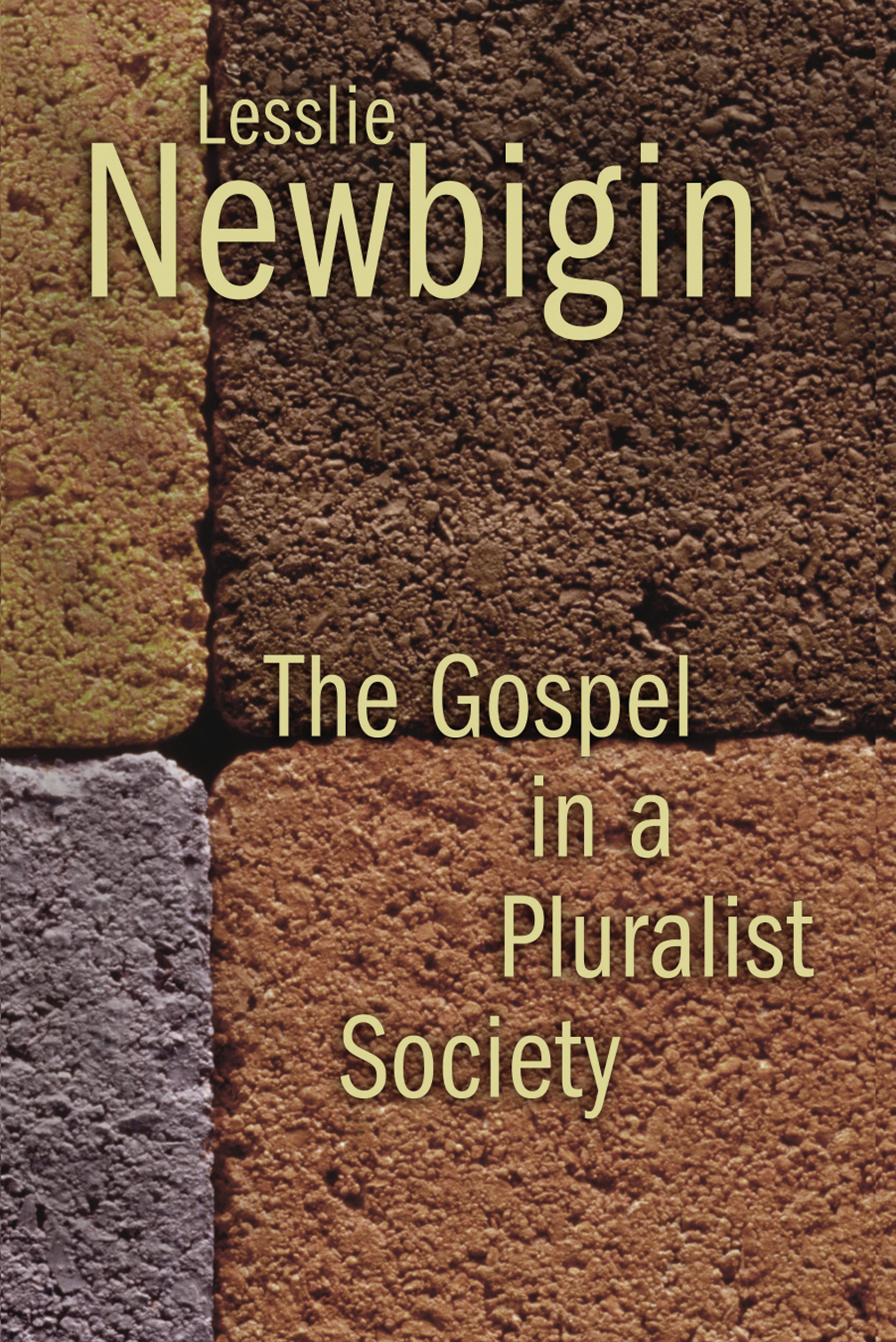
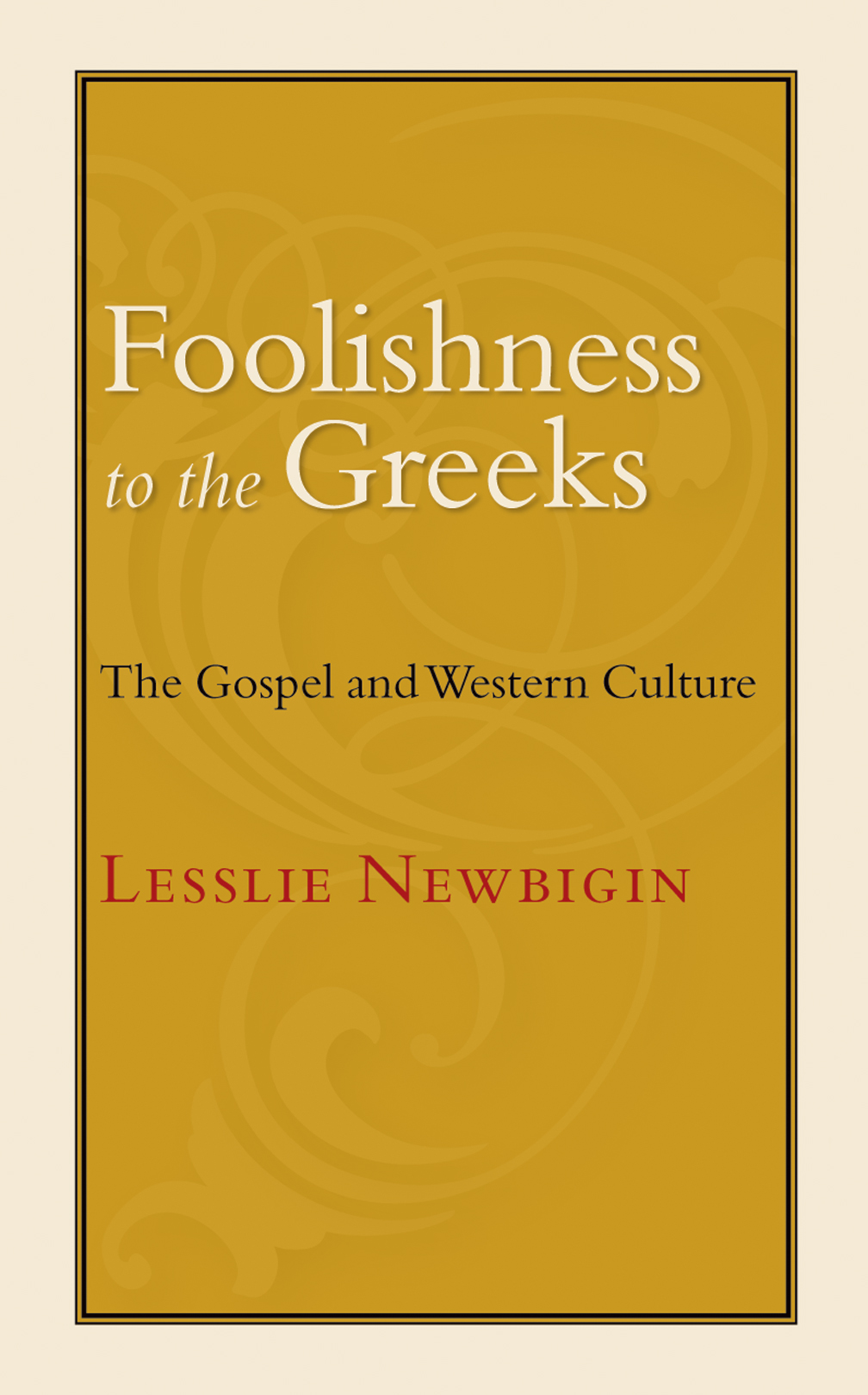 Pastor Newbigin asked, significantly, how the West, with its modernist influences (going back to the rationalism of the Enlightenment, at least) and its individualism and materialism and faith in progress and technology and the like have deformed our own understanding of and living of the gospel. Newbigin’s best-known books about these things are always in stock here at Hearts & Minds, published by Eerdmans: Foolishness to the Greeks: The Gospel and Western Culture, which is the one to start with, and The Gospel in a Pluralist Society, parts of which are on many people’s “must read” lists. We try to keep the entire list of The Gospel and Our Culture Network books in stock here as well. (The next, by the way, will be released and we will have in November of 2015 by Darrell Guder, entitled Called to Witness.)
Pastor Newbigin asked, significantly, how the West, with its modernist influences (going back to the rationalism of the Enlightenment, at least) and its individualism and materialism and faith in progress and technology and the like have deformed our own understanding of and living of the gospel. Newbigin’s best-known books about these things are always in stock here at Hearts & Minds, published by Eerdmans: Foolishness to the Greeks: The Gospel and Western Culture, which is the one to start with, and The Gospel in a Pluralist Society, parts of which are on many people’s “must read” lists. We try to keep the entire list of The Gospel and Our Culture Network books in stock here as well. (The next, by the way, will be released and we will have in November of 2015 by Darrell Guder, entitled Called to Witness.)
Mostly we keep these under church life – they ask the question of how our churches can be appropriately missional, aware of and savvy about the ways (good and bad) culture shapes church and ways of living in our culture effects how we think about the gospel itself.
DISPLAYED HERE AND THERE
We here at the shop will not only display Becoming the Gospel there, as part of that GAOC series, but also under Biblical studies, since it is a bit of superb New Testament work and should be read by Bible students, whether one is involved in the missional conversation on not. Granted there is a feisty bit of scholarly evaluation, and a missional hermeneutic, but it is, firstly, a book about Paul.
But, be warned: unlike some scholarly Biblical books (even conservatively orthodox ones) this one by Mike Gorman does have this stimulating, challenging, prophetic, missional perspective, and invites us not just to understand or believe the gospel, but to become it. It is not glib about language of transformation. It painstakingly engages the texts of Paul and invites us slowly into them, to inhabit the story, to become the gospel, in order to further and participate in God’s redemptive work in the world. You’ll find some surprising stuff here, I bet, and you will be wiser for it.
I hope you realize this is foundational stuff for us here at the bookstore.
PEOPLE OF THE BOOK?
We sell books – about all areas of life (even leisure and recreation, as we wrote about in our last post) — hopefully in the way of Christ, for sake of the world, for the glory of God. We know to do this (by God’s grace) because it is explained in the Book. We are book people, but, supremely, we are people of The Book. As much as we enjoy selling books about work and play, art and culture, politics and justice, health and wholeness, sex and marriage, science and technology, and so very much more, we cannot know what to think and do in this world without Christ, and we cannot know about Christ, who He is and what He did and what He calls us into, without the Book.
 We are sad that we don’t sell more books about the Bible, and apologize if we have ever given the impression that our bookstore is something other than a “Bible bookstore.” Of course we carry more than Bibles and have a dozens and dozens of categories other than Biblical studies. But let us be clear: we are people of the Book. Michael Gorman is a hero of ours, as it Tom Wright and Walt Brueggemann and so many others who can bring Biblical teaching to life, showing how it shapes us, to be the missional Kingdom people He calls us to be.
We are sad that we don’t sell more books about the Bible, and apologize if we have ever given the impression that our bookstore is something other than a “Bible bookstore.” Of course we carry more than Bibles and have a dozens and dozens of categories other than Biblical studies. But let us be clear: we are people of the Book. Michael Gorman is a hero of ours, as it Tom Wright and Walt Brueggemann and so many others who can bring Biblical teaching to life, showing how it shapes us, to be the missional Kingdom people He calls us to be.
OTHER TITLES BY MICHAEL GORMAN
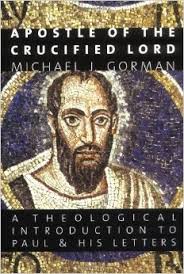 Paul: Apostle of the Crucified Lord: A Theological Introduction to Paul and His Letters (Eerdmans) $44.00 Massive, comprehensive, important, useful as a major study. It’s view is moderate, ecumenical, engaged with the current literature, but in a way, classic. Jeffrey Siker of Loyola Marymount says succinctly, “This is the best textbook on Paul I have found.” Professor Siker notes that Gorman’s ability to explain the backstory of each place to whom Paul was writing is very helpful, which is very important.
Paul: Apostle of the Crucified Lord: A Theological Introduction to Paul and His Letters (Eerdmans) $44.00 Massive, comprehensive, important, useful as a major study. It’s view is moderate, ecumenical, engaged with the current literature, but in a way, classic. Jeffrey Siker of Loyola Marymount says succinctly, “This is the best textbook on Paul I have found.” Professor Siker notes that Gorman’s ability to explain the backstory of each place to whom Paul was writing is very helpful, which is very important.
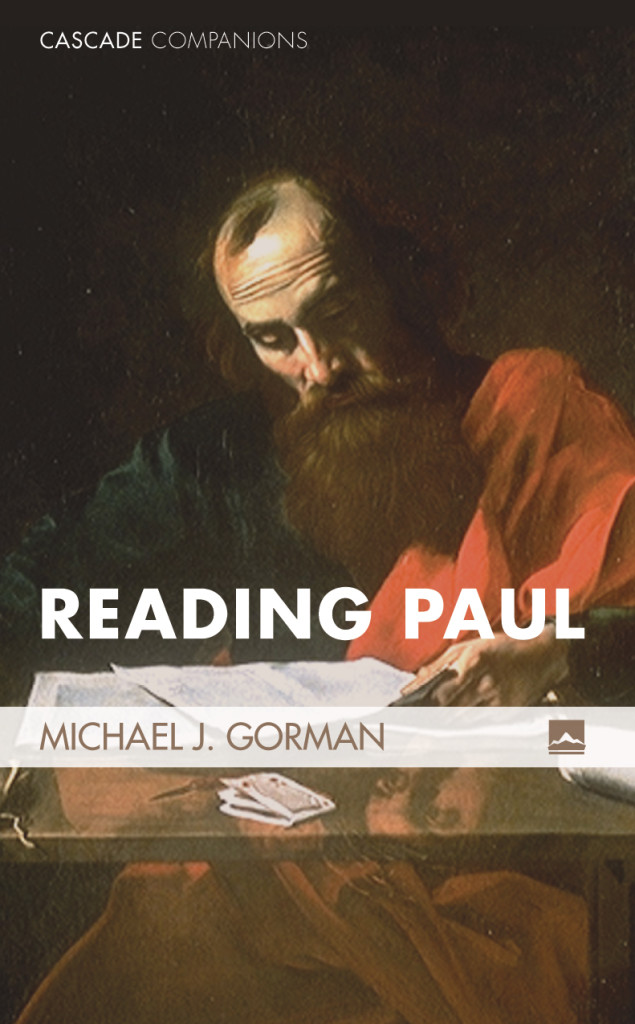 Reading Paul (Cascade Books) $22.00 This is a small handbook, a lovely, useful introduction. Professor Richard Hays says it is a “splendid introduction to the Apostle Paul is the best book of its kind: concise, wise, insightful, thoroughly conversant with the best recent scholarship, yet thoroughly clear and readable.” That’s an amazing endorsement! Some nice reflection questions at the end of each chapter, too.
Reading Paul (Cascade Books) $22.00 This is a small handbook, a lovely, useful introduction. Professor Richard Hays says it is a “splendid introduction to the Apostle Paul is the best book of its kind: concise, wise, insightful, thoroughly conversant with the best recent scholarship, yet thoroughly clear and readable.” That’s an amazing endorsement! Some nice reflection questions at the end of each chapter, too.
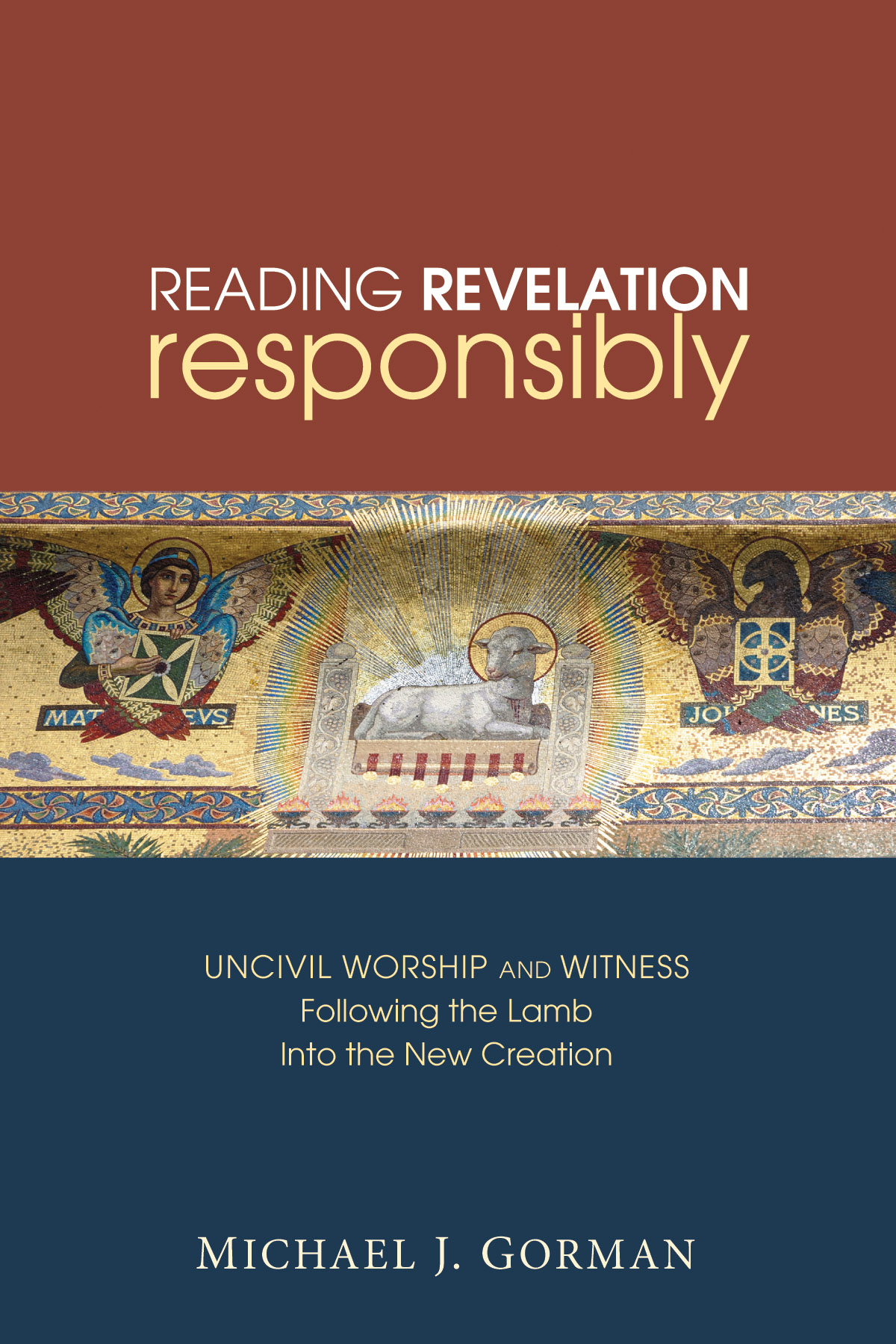 Reading Revelation Responsibly: Uncivil Worship and Witness: Following the Lamb into the New Creation (Cascade Books) $25.00 This is a major contribution, and you really should own it. On one hand it is very accessible, almost introductory (making it great for congregational use, for small group Bible studies and book clubs) but also bringing some hefty missional concerns to the fore, reminding us also of the politics of redemption and the hope that should infuse us now as we trust in the final reign of God. Get that subtitle, eh? Wow. This is remarkable.
Reading Revelation Responsibly: Uncivil Worship and Witness: Following the Lamb into the New Creation (Cascade Books) $25.00 This is a major contribution, and you really should own it. On one hand it is very accessible, almost introductory (making it great for congregational use, for small group Bible studies and book clubs) but also bringing some hefty missional concerns to the fore, reminding us also of the politics of redemption and the hope that should infuse us now as we trust in the final reign of God. Get that subtitle, eh? Wow. This is remarkable.
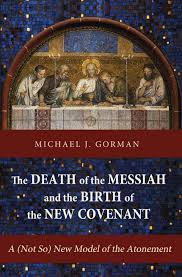 The Death of the Messiah and the Birth of the New Covenant: A (Not So) New Model of the Atonement (Cascade Books) $33.00 This is a serious work, emerging originally from his prestigious Dunning Lectures at Saint Mary’s Seminary. This brings Gorman’s keen understanding of the missional impulse in Paul to bear on his reflections on the meaning of the cross, the subsequent ways of expressing the mysteries of the atonement. It strikes some as a ground-breaking work, and Gorman asks why there is no theory or model of the atonement called the “new covenant” model, since this understanding of the atonement is likely the earliest in the Christian tradition, going back to Jesus Himself. In ways that point towards his work on Paul, he ends this book making a case that in this re-disovery of the ancient model of covenant atonement we are invited to a “life of communal and individual participating in Jesus’ faithful, loving, peacemaking death.” There are amazing blurbs on the back, from Scot McKnight to Willard Swartley to Joel Green. Cherith Fee Nordling says the book “sounds the clarion call of the New Testament.” I like the endorsement from John E. Wright, of Point Loma University, who notes “Thanks to Michael Gorman for taking us beyond endless discussion of the ‘how’ of Christ’s atonement to its visible end. Christ’s atonement as manifest in the life of the church, for the sake of the world.”
The Death of the Messiah and the Birth of the New Covenant: A (Not So) New Model of the Atonement (Cascade Books) $33.00 This is a serious work, emerging originally from his prestigious Dunning Lectures at Saint Mary’s Seminary. This brings Gorman’s keen understanding of the missional impulse in Paul to bear on his reflections on the meaning of the cross, the subsequent ways of expressing the mysteries of the atonement. It strikes some as a ground-breaking work, and Gorman asks why there is no theory or model of the atonement called the “new covenant” model, since this understanding of the atonement is likely the earliest in the Christian tradition, going back to Jesus Himself. In ways that point towards his work on Paul, he ends this book making a case that in this re-disovery of the ancient model of covenant atonement we are invited to a “life of communal and individual participating in Jesus’ faithful, loving, peacemaking death.” There are amazing blurbs on the back, from Scot McKnight to Willard Swartley to Joel Green. Cherith Fee Nordling says the book “sounds the clarion call of the New Testament.” I like the endorsement from John E. Wright, of Point Loma University, who notes “Thanks to Michael Gorman for taking us beyond endless discussion of the ‘how’ of Christ’s atonement to its visible end. Christ’s atonement as manifest in the life of the church, for the sake of the world.”
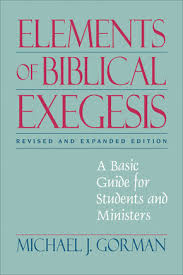 Elements of Biblical Exegesis (Revised and Expanded Edition) (Baker Academic) $21.99 This is a substantial handbook, a serious guide to how to read, interpret, and apply the Bible, passage by passage. Very thoughtfully done. Exegesis is another one of those fancy words, but it is an essential one, and knowing about it is helpful. Beverly Gaventa (Professor of New Testament Exegesis at Princeton Theological Seminary) says, cleverly and properly that “No one ever became an exegete by reading a book on exegesis. The gift of Michael Gorman’s book is that he knows that exegetes are born through practice, practice, practice, and more practice. And he invites his readers into just the practice they need, providing them with a rich array of helps along the way. Beginners and improvers alike will benefit…” If you are a Bible student, this book is hard to beat. If you teach the art of reading the Bible well to others, again, this book is hard to beat. It is a hand-on guide that breaks the task down into seven distinct elements., and suggests exercises to enhance your abilities within each. For what it is worth, he has his reasons to think that the ESV (and the old RSV upon which it is based) is useful, but not as impeccable as the promoters suggest. Fascinating.
Elements of Biblical Exegesis (Revised and Expanded Edition) (Baker Academic) $21.99 This is a substantial handbook, a serious guide to how to read, interpret, and apply the Bible, passage by passage. Very thoughtfully done. Exegesis is another one of those fancy words, but it is an essential one, and knowing about it is helpful. Beverly Gaventa (Professor of New Testament Exegesis at Princeton Theological Seminary) says, cleverly and properly that “No one ever became an exegete by reading a book on exegesis. The gift of Michael Gorman’s book is that he knows that exegetes are born through practice, practice, practice, and more practice. And he invites his readers into just the practice they need, providing them with a rich array of helps along the way. Beginners and improvers alike will benefit…” If you are a Bible student, this book is hard to beat. If you teach the art of reading the Bible well to others, again, this book is hard to beat. It is a hand-on guide that breaks the task down into seven distinct elements., and suggests exercises to enhance your abilities within each. For what it is worth, he has his reasons to think that the ESV (and the old RSV upon which it is based) is useful, but not as impeccable as the promoters suggest. Fascinating.
BookNotes
DISCOUNT
ANY ITEM MENTIONED
20% off
order here
takes you to the secure Hearts & Minds order form page
just tell us what you want
inquire here
if you have questions or need more information
just ask us what you want to know
Hearts & Minds 234 East Main Street Dallastown, PA 17313 717-246-3333
